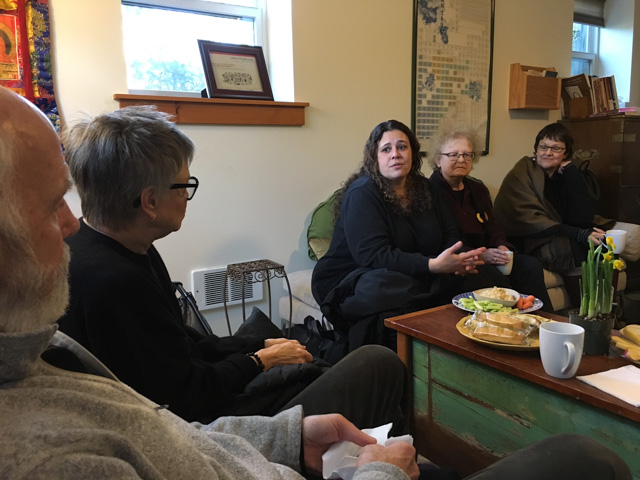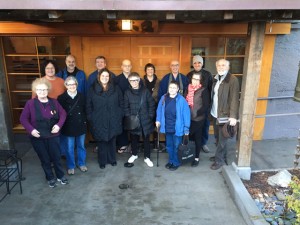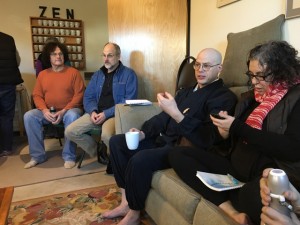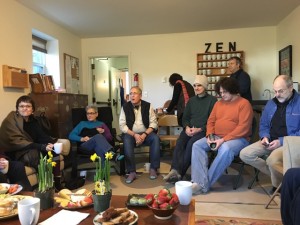Buddhists Share Compassionate Action Projects
Written by: Polly Trout

From left, Roberta Brownroot, Polly Trout, Anne Howells and Sally Metcalf discuss compassionate action.
Photos by: Genjo Marinello
The Buddha’s noble eight-fold path instructs us to pay attention to how we live our values in the world. Shakyamuni Buddha emphasized the importance of acting with kindness, generosity, patience and diligence throughout his teaching career.
In January, about two dozen people gathered at Chobo-Ji Zen Temple in Seattle to talk about compassionate action: How we can practice the teachings of Buddha in our daily lives, in ways both big and small. Members of seven different sanghas were present at this Mahasangha event, cosponsored by Chobo-Ji and Patacara Community Services.

A gathering from many sanghas – Fack Row: Tim Tapping, Sakya Monastery and Northwest Dharma Association Board; George Draffan, Natural Awareness and NWDA Board;Chris Jeffries, Tendo, Sally Metcalf, Genjo Marinello, Chobo-Ji; Denis Martynowych, BPF, Randy Hoehn
Front Row: Anne Howells, Chobo-Ji; Sue Hodes, Lotus Sisters and Buddhist Peace Fellowship; Polly Trout, Patacara Community Services; Roberta Brownroot, Genko Blackman, Chobo-Ji and Nalandabodhi; name unknown.
The group discussed the interdependent relationship between direct service work with those who are suffering, and political advocacy work that promotes positive system change. Each is nourished by close cooperation with the other.
While some of us may be more called to focus on one or the other, it is important for both groups to communicate and work together.
For example, Patacara Community Services is currently focusing on providing healthy meals to our neighbors suffering from homelessness. While doing that work, we also talk to the people we are serving about what is important to them, what they need, and how they can become more empowered to speak their truth to power.
Connecting direct service and advocacy invites disempowered people into the work of system change, and allows us to have more wisdom and skillful means in our work.
Participant in the January gathering shared about their current efforts in these areas:
- Prison work
- Homelessness
- Environmental activism
- Peace activism
- LGBTQ activities
- Native American issues
- Hospice
- Policy issues
- Hunger issues
- White privilege
Genjo Osho, abbot of Chobo-Ji, discussed its participation in the Faith Action Network (FAN), an interfaith coalition of faith communities working in Washington State. FAN’s 2016 legislative agenda is focused on five areas:
- Reducing wealth inequality
- Fully funding and protecting health and human services and mental health programs, and public education dismantling the culture of violence
- Protecting housing and preventing homelessness
- Sustaining Washington’s environment
FAN has 17 regional clusters statewide, two of which currently include Buddhist members. Chobo-Ji is a member of the West Seattle/Beacon Hill Cluster; and the Olympia Zen Center and the Plum Mountain Buddhist Community in Aberdeen are both members of the Olympia cluster. We talked about how excellent it is when Buddhist groups participate in interfaith forums.

People from many groups can support one another in compassionate action.
Denis Martynowych shared upcoming projects that Buddhist Peace Fellowship (BPF) Seattle will be working on. BPF Seattle is currently offering a class called White Awake, helping white people become wiser, more self-aware, and more skillful in their work to undo racism. BPF is also working on farmworkers’ rights, especially the boycott of Sakuma Berries.
Genko ni Osho, who is a member of both Chobo-Ji and Nalandabodhi, was asked to talk about her prison work. She coordinates a team of volunteers who teach dharma in the prison at Monroe, north of Seattle. They lead Buddhist services that can include chanting, basic dharma teachings, and meditation.
Genko said people who feel called to volunteer in prisons should commit to doing it for a number of years, because it takes time to become skillful in this work and to build up trust with the prisoners. Volunteers can also write letters to prisoners, or support them after are returned to the community.
For example, The Freedom Project in Seattle is starting a meditation group for former prisoners that will be meeting monthly in Seattle’s University District. The project is looking for teachers who can support that group.

Members of seven sanghas met to discuss compassion.
“One thing that volunteering in the prisons has taught me is that compassion does not go in just one direction,” Genko said. “As volunteers we are not going into the prisons to bring or show compassion towards prisoners. All we can do is show up and relate in an authentic way with the prisoners – and with the custody staff – and compassion flows from relating to each other in an honest and open way, open to all the joys and sorrows of our lives.”
Doing practical things daily to reduce suffering and increase wholesomeness in the world is an integral part of the dharma.
It brings about equanimity and joy; it reduces suffering not only externally, but also internally, as the practitioner learns to let go of self. Compassionate action is a healthy antidote to negative emotions and thoughts.
If you or your sangha would like advice about how to plan and implement a compassionate action project that is a good fit for your talents and resources, you can contact Polly Trout at Patacara Community Services. She is available to meet with you or your sangha to help with that process.
For more information, visit:
Patacara Community Services: http://patacara.org
Chobo-Ji 100 meal program/Social Action Committee http://choboji.org/engaged-buddhism/
Buddhist Peace Fellowship http://www.buddhistpeacefellowship.org
Buddhist Peace Fellowship – Seattle Chapter: https://www.facebook.com/BPFSeattle/?fref=nf
Faith Action Network http://fanwa.org
White Awake http://whiteawake.org/2015/12/26/plans-for-2016/
Eco-sattva Training: http://www.oneearthsangha.org/programs/ecosattva-training/
